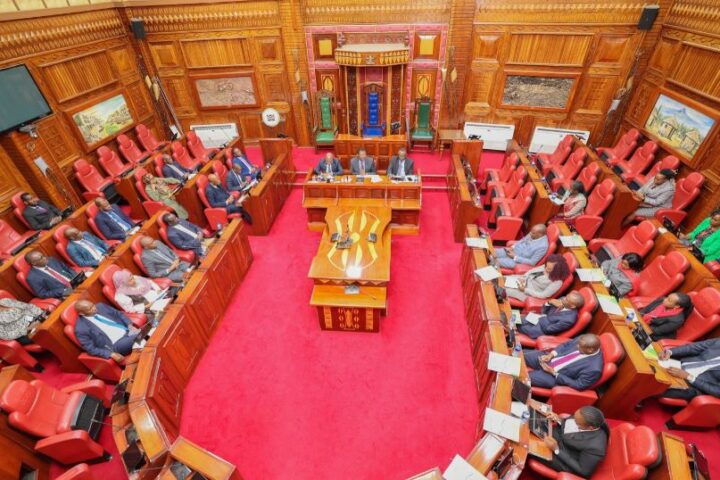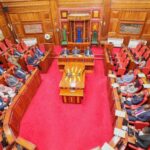
- Sir, I am a small shareholder of Kenya Airways who, like other shareholders, has gone for many years with without dividends due to the massive losses the company has been reporting in recent years. What new revenue streams are you looking at to boost the profitability and stability of KQ and make shareholders happy? Dan Murugu, Nakuru
I perfectly understand the shareholder expectations on payment of dividends from KQ. The current situation is, however, that unlike in the past, KQ’s position has been affected by a drastic change in market conditions which in turn affected the organisation’s profitability. My focus is on improving our equity and balance sheet by employing a different operating model, so we get back to profitability. These include development of ancillary revenue streams, improving the efficiency of our aircraft deployment, opening new routes and developing a maintenance, repair and overhaul (MRO) strategy.
We will need to leverage our profits to support the growth of the airline back to a respectable financial position to enable us pay dividends. Significant reinvestment is, therefore, required to return the airline to its rightful position as a major player in the Africa aviation market. Our overall aim is to return to a sustainably positive financial position where we can meet shareholder expectations.
- Your initial two-year term will be coming to an end by June this year. Do you intend to stay on? Fredrick Mulama, Bungoma
Let me take this opportunity to once again give the correct position regarding my contract. It is for a three-year period. It runs from June 1, 2017 and ends in June 2020.
- When you were at the helm of LOT Polish Airlines you were credited with turning around the company. What measures have you so far implemented to rid KQ of mismanagement and corruption to enable it compete effectively with other airlines? Andrew Maranga Ratemo, Malindi
Firstly, the allegations of corrupt practices in the company in the past are yet to be proven to the relevant authorities, and I welcome anyone with proof to present them. This is the only way we can make true change.
From the time I joined KQ, market conditions have changed. The airline environment has become more competitive and we therefore need to adapt to remain relevant. From a human resource perspective, we need to shift the mindset that we are a State corporation and adopt a private sector approach to recover market share. This is a key focus area and is what we have started implementing to bring back the airline to profitability. We are opening new destinations like New York and will soon open Geneva and re-establish Rome where we will use our Dreamliners.
What happened in LOT Polish Airlines was similar to the KQ situation, where despite a financial bailout we quickly undertook a restructuring that enabled it to grow back to profitability. I intend to deploy a similar strategy in ensuring the efficient growth of KQ.
- On KQ’s proposed but already controversial Public-Private Partnership (PPP) with Kenya Airports Authority over management of JKIA, can you confidently assure staff of both KQ and KAA that their jobs will be secure if the proposal finally goes through? Okulo Andrew Guya, University of Nairobi
Let me first dispel the rumour that the PPP is controversial. This project has already been publicly condemned by commentators without taking time to understand the issues currently affecting Kenya’s aviation sector. Let us put KQ aside for a moment. Kenya’s aviation market is slowly losing share and if something is not done to arrest it, it will lose its position as a regional hub, affecting jobs and ultimately Kenya’s economy. The motivation of this PPP proposal is informed by these market conditions to ensure that we reverse the trend. The proposal is to have an SPV (special purpose vehicle) structure whose sole aim is to ensure that both KAA’s assets at JKIA and Kenya Airways—KAA’s main customer—can compete effectively with other airports and carriers in the region. This is how our competitors are currently operating. We want to grow us as we grow the aviation industry in Kenya. We have no plans at all to declare any staff redundant. In fact, we are in the process of finalising the recruitment of 48 more pilots, 100 more flight attendants and have advertised for an additional 87 Assistant Flight Pursers. This is informed by the continued expansion of our network and our ambitious business aspirations.
- Concerns have been raised that you have brought in many Poles who now call the shots at KQ. How true is this and could you give a breakdown of the expatriates by their nationalities currently working at KQ? David Mutua, Kilifi
The issue of expatriates has been blown out of proportion. KQ is a Kenyan company that operates in a global market. As such it competes with international players and needs different points of view and perspectives on the business. It needs to source talent globally as well as locally. This is normal in Airline operations. As of today, Kenya Airways employs 18 expatriates, including all secondments, out of the total number of more than 3,000 employees. This is approximately 0.6 per cent of the entire KQ staff. For your information, we have 36 Kenyans working as expatriates in other countries in the world. Should we therefore bring them back to Kenya? If we want to be global, then let us think global.
- News about negative performance of Kenya Airways have for years dominated the media but given the time you have been at the helm since 2017, I believe you now know more about the airline than the rest of us. What exactly has been ailing our national carrier? Francis Njuguna, Kibichoi
It is easy to bash the airline when all is not well without taking effort to understand the real reasons things did not work out. I would rather draw lessons from it to guide our forward strategy. At the moment our focus is on returning us to profitability through reviewing our operating model to better compete in the market, efficiently deploying our assets, building our MRO capacity, and enhancing our customer experience alongside other revenue generating initiatives.
- Among the many causes for KQ’s current financial troubles is the use of many special purpose vehicles that were registered in Cayman Islands and other tax havens, and whose owners are unknown, but which were used to purchase aircrafts on behalf of KQ at exorbitant prices. They include Amboseli Limited, Walkers SPV and Samburu Ltd. In the proposed takeover of JKIA, KQ is again proposing setting up another SPV for the purpose of running the airport. What assurance do we, as Kenyans, have that this SPV will not take us to where earlier ones have confined KQ? Wafula Pius, Nairobi
SPVs have been wrongly judged in the public domain, yet there is no proof that they are involved in any financial impropriety. SPVs are basically subsidiaries that protect the financier from bankruptcy and are common in financing of large assets like ships and aircraft. From a financier’s perspective, loans are made to SPVs, where the aircraft are owned by the SPV for the duration of financing. The SPVs are incorporated in the Cayman Islands as it is a tax-efficient jurisdiction which benefits all parties in the transaction. To give you an example, JamboJet is actually an SPV formed to run operations of a competitively priced regional carrier.
- Sir, your chairman, Michael Joseph, in a ‘Right of Reply’ piece in this paper last week did elaborate that the proposed PPP deal, among other benefits, will increase jobs from the current 950 to more than 3,000. However, employees, through their union leaders, are some of the fiercest critics of the deal. In fact, they want you and Mr Joseph out soonest. Why would employees fight a scheme that would guarantee their jobs and create more jobs for other Kenyans? How will you overcome the politics in this issue? Komen Moris, Eldoret
I was also totally surprised by the union’s actions. As KQ, we have submitted a proposal to KAA which is under consideration. KAA then needs to come back to us with their submission. In short, we are not at the stage where management is expected to engage the unions in discussions. The impression created that the proposal was finalised is therefore false and is meant to fuel negative political sentiment on a straightforward process. We are, however, committed to engaging with the union on this issue.
- KQ has been facing serious competition in the region, with Ethiopian Airways doing much better than KQ while RwandAir has also made positive steps which threaten KQ’s dominance. In Tanzania, the government has recently been making heavy capital investment in their national carrier. How does KQ intend to go about this situation and emerge unscathed in the cut-throat competition that commercial aviation has become? Boniface Shimoli, Nairobi
I fully share your point of view on the market. Our model which has been successful in the past needs to be reviewed, vis-a-vis that of our competitors. We have to adapt to compete effectively, hence the proposal to mirror the competition’s business model, by consolidating airport and airline assets that will enable us jointly benefit from revenue growth. Our aim is to bring JKIA and Kenya Airways to the Top Five ranking in terms of cargo and passenger traffic and financial performance.
- In October last year, Kenya Airways launched the much-publicised direct flights to the US then shortly after reduced the frequency. Could the reduction have been a result of poor or inadequate market research? Janet K. Mwaita, Nairobi
We conduct market research to ascertain the viability of any route we are considering and New York was no exception. Kenya Airways started marketing the New York route at least one year prior to the maiden flight, and we took an aggressive market entry approach, selling the seven-day a week proposition. As we progressed we realised that seasonality is a big factor in US market behaviour.
Like any business, we factored this through tactical changes to our schedule and adopted a seasonal cycle that would have five flights a week during the low season and seven flights a week during the high season. Daily flights will resume from June 20 to September 8, 2019, and from December 15, 2019 to January 15, 2020. This business cycle enables us to better optimise our investment in the route. We remain strongly committed to the New York route.
- In 2012, the previous KQ management carried out retrenchment that the courts later found to have been done unfairly. Is there a chance that the company can review some of the genuine cases and give those individuals a second chance especially if they have upgraded their skills that are relevant in the industry? I am one of the victims of the retrenchment. Antony Ngumbau, Nairobi
I do empathise with the situation. Retrenchment is never an easy exercise for any company to undertake as it touches on the livelihoods of the staff affected. As Kenya Airways, we are constantly looking out for the best talent with the skills and experience needed to enable us to meet our strategic agenda and to meet our business objectives. I encourage you to look out for opportunities that we may advertise.
- Suppose the proposed PPP deal on JKIA does not work out, what will be the immediate and long-term consequences to Kenya Airways? Would you lose a night’s sleep if the proposed deal failed? Brian Okudo Ochieng’, Migori
Our immediate focus will be to review our growth strategy and to make the necessary adjustments. If the proposal does not go through, we do have other options. However, we all need to realise that it will take longer to realise our growth ambitions. Consequently, Kenya’s position as a regional hub will also be affected.
- For several years, KQ has been losing some of their best pilots, engineers and even cabin crew to rival airlines like Emirates. Why can’t KQ attract and retain its most skilled people? Steve Biko, Awasi
The correct position is that this has been happening over the last two years. Staff leaving one organisation for another is a normal occurrence, even in the aviation industry. The reasons vary, from remuneration, to career growth and even to the environment. I am afraid I cannot answer for those who have left but I believe that KQ is still an attractive employer as we are still actively recruiting pilots, engineers and cabin crew.
- Sir, with regard to Dreamliners, initially KQ had made it public that they were purchasing the aircrafts. However, some reports now suggest that KQ was leasing the Dreamliners from a company called Awas Aviation. Could you offer clarity on this matter? Francis Kimani, Nairobi
Contrary to the way this issue has been sensationalised in the public, Kenya Airways leases its aircraft from reputable aircraft leasing companies. KQ has a fleet of nine Dreamliners which are currently in operation. Out of the nine, six are on finance lease which means KQ is servicing loans towards final ownership of the aircraft (equivalent to house mortgage, where you have right of use and eventually right of ownership is transferred upon completion of the loan). The other three are on operating leases. This is a contract that allows for the use of assets but does not convey rights to ownership. The current lessors of the three leased aircraft are Peregrem, BOCA and Dubai Aerospace. All these are reputable aircraft leasing companies.
- It is almost two years since you took over at Kenya Airways with a promise to rescue it from the financial difficulties it was in. What was the status of KQ then and how is it now? Flora M. Koech, Nairobi
I am optimistic. After two years at the helm, we have progressively improved our financial position. We have seen significant year-on-year revenue growth both in passenger and cargo business. We also continue to pay attention to costs. Management is committed to grow revenues and to address cost challenges. This will be a long and challenging process, but we are optimistic that we are on the right track.
Source: Nation.co.ke






